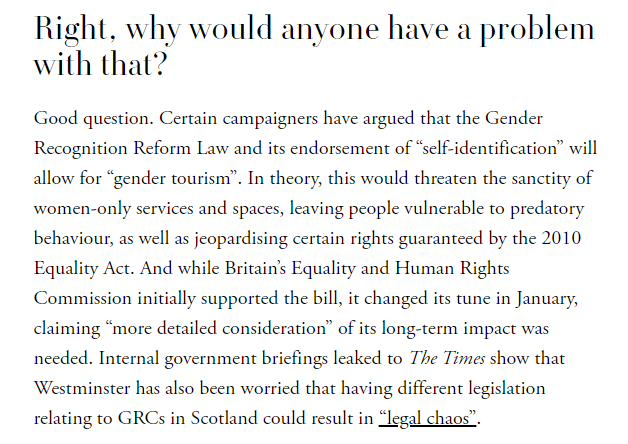Fact Check: What a Gender Recognition Certificate Does in the UK
Many news outlets are amplifying misleading information about gender recognition certificates. We asked: What does a GRC actually do?
by Evan Urquhart
An unprecedented showdown is coming, pitting the national government for the United Kingdom, led by Prime Minister Rishi Sunak against the devolved government of Scotland led by First Minister Nicola Sturgeon. The topic of the clash is the procedure under which trans people can apply for and receive a gender recognition certificate (GRC).
What exactly would the law do? Under the current procedure, a trans person needs to amass evidence that they’ve spent at least two years living full time as the gender they wish the certificate to reflect. They also need 2 letters from medical professionals registered in the UK. The letters must detail social and medical steps they’ve taken to transition, and one of the letters must include a formal diagnosis of gender dysphoria. The new law would allow trans people in Scotland who are over the age of sixteen and have lived in their gender for at least three months (six months for 16 and 17-year-olds) to “make a legally binding declaration that they are already living in their acquired gender and intend to do so permanently.”
In other words, the Scottish law makes it much easier and quicker to recieve a gender recognition certificate.
Media accounts have largely explained the reasons opponents give for their opposition without bothering to fact-check their claims. Reporting on this ranges from a standard “both sides” formulation, where each side of the issue is represented but the article fails to make clear which side has fact on its side, to a repetition of the opposition’s claim without bothering to provide a rebuttal at all.
An example of the both sides approach can be found in the coverage of this story on CNN.
One example of the one-sided approach was found in Fox News, which published a misleading account of the stakes soon after news of the constitutional crisis over GRCs dropped. Another one-sided account appeared in British Vogue this morning:
Ultimately the question of whether GRC reform impacts single-sex spaces is is not a matter of opinion. The law itself would either allow for more access to women’s spaces or it would not. So what does having a gender recognition certificate actually do?
In the UK, a gender recognition certificate is required for the law to view a trans person as a member of the opposite sex. It certainly sounds significant, as if it would allow trans people access to a whole lot of things! However, when you look at the details, that is simply not the case.
In fact, many trans people in the UK who would qualify for a GRC under the current law don’t bother to seek one. A GRC is not required for a trans person to change their sex on their driver’s license, or on their passport. Both of those accept a GRC, but also accept a single letter from a doctor instead. A GRC is not required to use the bathroom, access services at a domestic violence shelter, to enter any other single-sex space or to access any other service in the UK.
A gender recognition certificate is required for a trans person to change their birth certificate, to have the right gender listed on a marriage license, and to have it listed on a death certificate after a trans person dies. These documents are important to many people, and a streamlined process would doubtless mean that many more trans people would find it worth the trouble to apply. GRCs have no implications outside of these documentation changes, though. The official government website for the UK itself makes all of this clear:
Every article which quotes opponents saying that this issue is about single sex spaces needs to make it clear that these opponents are either lying or misinformed. Trans people do not need a GRC to access single-sex spaces because birth certificates aren’t required to for cis women to access single-sex spaces. Likewise, a GRC couldn’t help a criminal commit a crime against women because criminals aren’t required to show documentation of their legal gender before committing crimes. GRCs aren’t even used in deciding whether to house trans prisoners in men or women’s prison in the UK. Those determinations are made on a case by case basis by relevant authorities.
As the news media cover the escalating clash between Scotland and the national government of the UK, it’s important that readers are not misled about the basic facts. The changes to the GRC process would not impact single-sex spaces or women’s safety in any way. That’s not anyone’s opinion, it’s the truth.





